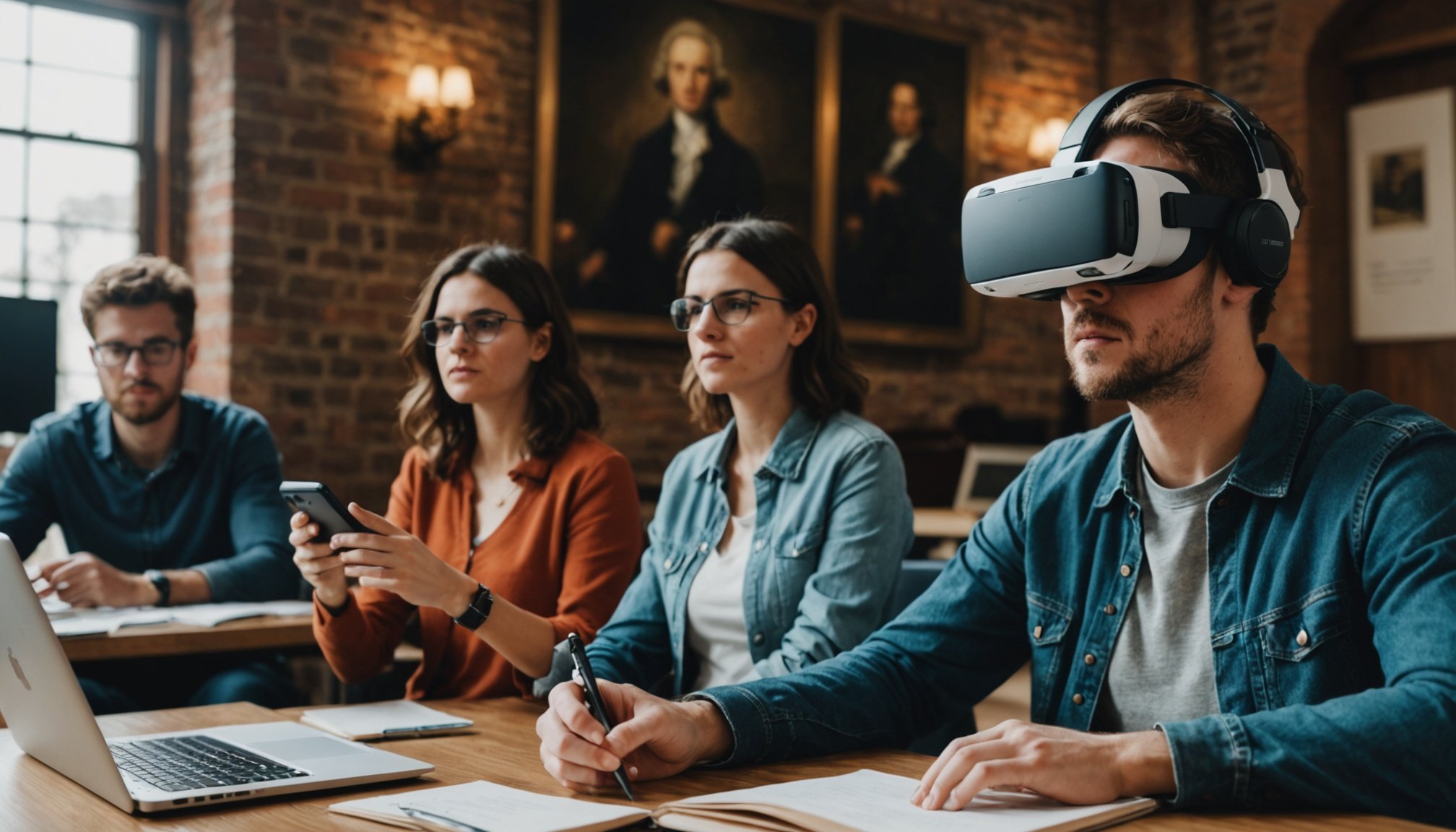Overview of VR in UK Higher Education
Virtual reality (VR) is significantly transforming the landscape of UK universities, providing immersive and transformative learning experiences that traditional methods often lack. As an advanced technological tool, VR is facilitating a more interactive and engaging educational environment. This is proving especially beneficial in areas such as medical training, engineering simulations, and even arts and humanities.
One notable trend is the increased implementation of VR in various disciplines across universities. Institutions like the University of Portsmouth and University of London are pioneering these efforts, incorporating VR into their curricula to allow students to explore complex subjects in entirely new ways. This trend is likely to expand further as VR becomes more accessible and integrated into educational frameworks.
Topic to read : Unlocking growth: tackling common scaling challenges for uk businesses and proven solutions
The impact of VR on student engagement and learning outcomes cannot be overstated. It allows for transformative learning experiences that spark curiosity, enhance problem-solving skills, and improve knowledge retention. Through VR applications, students benefit from a safe, controlled environment where they can experiment and learn without the fear of real-world consequences, thus significantly boosting their engagement levels and academic performance.
Benefits of VR for Online Learning
In the realm of online education, VR offers distinct advantages that are revolutionizing student experiences. At the forefront is the enhanced interactivity and immersion provided by VR technologies. Unlike traditional online platforms, VR creates a classroom where students can actively engage with the material. Imagining a physics class where students can visualize and manipulate atoms in a 3D environment illustrates this advantage clearly.
Also read : Unlocking growth: networking strategies for uk startups to broaden their horizons
Additionally, VR facilitates experiential learning, significantly improving knowledge retention and understanding. The immersive nature of VR allows students to experience lessons rather than simply read or hear about them, making abstract concepts more tangible. For example, history students might explore ancient civilizations by virtually “walking” through historical sites, leading to a more profound, memorable learning impact.
Another crucial benefit of VR in education is the flexibility it provides, catering to diverse student needs. Whether studying from home or across the globe, VR ensures all learners can access the same quality of education, supporting inclusivity. Essentially, VR in education not only bridges geographical gaps but also personalizes learning experiences. As this technology continues to evolve, the advantages it offers in online education will likely expand, reinforcing its value and necessity in academic settings.
Case Studies of Successful VR Integration
Exploring recent VR case studies within UK universities reveals a variety of successful implementations intriguing in their scope and variety.
University of Portsmouth: Virtual Reality for Anatomy Studies
The University of Portsmouth has pioneered the use of VR in anatomy studies. By employing VR technology, students interact with complex human body models. This virtual dissection not only enhances understanding but also provides a risk-free environment for exploration. Feedback indicates students appreciate the ability to manipulate anatomical structures, leading to better retention.
University of London: Immersive Language Learning Programs
At the University of London, immersive language learning programs leverage VR to transport students into native-speaking environments. This approach fosters language acquisition by enhancing engagement and real-world application. Interactive scenarios, such as shopping at a Parisian market, ensure practical communication skills thrive.
University of Bristol: Collaborative VR Projects
Meanwhile, the University of Bristol’s focus is on collaborative VR projects. These projects unite students across disciplines, using VR to solve complex challenges. By fostering interdisciplinary cooperation, these initiatives develop critical problem-solving skills, preparing students for future careers. Faculty and students report increased motivation and dynamic lesson experiences through these programs.
Challenges in Implementing VR in Education
Adopting virtual reality (VR) in education presents a set of challenges despite its potential benefits. One significant barrier is the high costs involved. Implementing VR systems requires substantial financial resources for both hardware and software. This challenge often limits access for some institutions, particularly those with tighter budgets.
Technical infrastructure must also be able to support advanced VR technologies. Adequate resource allocation for upgrading systems is essential to prevent technological bottlenecks. Educational institutions often face challenges in preparing the necessary infrastructure, as it requires long-term planning and investment.
Another hurdle is the need for comprehensive training for faculty and students. Successfully integrating VR into curricula requires educators to be well-versed in operating these technologies. Without proper training, the effectiveness of VR in enhancing students’ learning experiences might be compromised.
Moreover, there can be a resistance to change among educators who prefer traditional teaching methodologies. Such resistance can stem from unfamiliarity with new technologies or skepticism about VR’s effectiveness. To mitigate this, institutions could focus on showcasing compelling evidence of VR’s positive impact on learning and promoting a culture of adaptation and progress within educational settings.
Future Trends and Innovations in VR Education
As we gaze into the future of VR in education, significant advancements loom, promising to reshape how UK universities approach learning technologies. One notable trend is the evolution of VR tools, continuously refining through artificial intelligence and machine learning. These technologies not only enhance VR’s realism but also personalise learning experiences by adapting to individual student needs and responses.
Furthermore, the role of ongoing research and development cannot be underestimated. Funding and collaboration between educational institutions and tech companies are crucial. This encourages innovation in VR hardware and software, ensuring they remain at the cutting edge. UK universities are expected to play a pivotal role in these developments.
Predictions suggest more sophisticated and accessible VR technologies will integrate further into online education, offering students worldwide a more immersive and engaging experience. The adaptability of VR systems will enable educators to seamlessly incorporate them into various curricula, enriching traditional teaching methods and preparatory programmes. This evolution promises not only to transform the academic landscape but to empower students by providing them with diverse, flexible, and inclusive learning opportunities, further solidifying VR’s presence in contemporary education.






